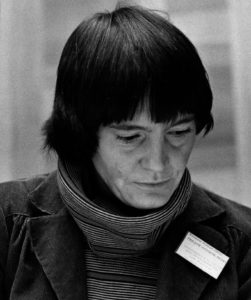
DICK BANCROFT
Ted Means, Pat Bellanger, and Bill Wahpepah standing at the podium where speeches and over a hundred testimonies of abuse and exploitation were given at the 1977 UN Geneva Conference.
Roxanne was born in San Antonio, Texas, in 1939 and grew up in Central Oklahoma, daughter of a sharecropper and a mother that Dunbar believes to have been partially Native American. Dunbar”'s paternal grandfather, a settler of Scots-Irish ancestry, was a landed farmer, veterinarian, a labor activist and a member in Socialist Party and Industrial Workers of the World, “Wobblies.” Her father was named after the leaders of the Industrial Workers of the World””Moyer Haywood Pettibone Scarberry Dunbar. Her father”'s stories of her grandfather inspired her to lifelong social justice activism.
Married at 18, she and her husband moved to San Francisco three years later, where she has lived most of the years since, although the marriage ended. Her account of life up to leaving Oklahoma is recorded in Red Dirt: Growing Up Okie. She has a daughter Michelle. She later married writer Simon J. Ortiz.
Graduated from San Francisco State College 1963, B.A. History. History Doctorate degree from University of California, Los Angeles 1974; completed the Diplôme of the International Law of Human Rights at the International Institute of Human Rights, Strasbourg, France in 1983 and an MFA in Creative Writing at Mills College in 1993.
Was a full-time activist 1967-1974 in various parts of the U.S., traveling to Europe, Mexico, and Cuba. She is also a veteran of the women”'s liberation movement. Outlaw Woman: Memoir of the War Years outlines this time of her life, chronicling the years 1960-1975. She contributed the piece “Female liberation as the basis for social revolution” to the 1970 anthology Sisterhood is Powerful: An Anthology of Writings From The Women”'s Liberation Movement, edited by Robin Morgan. In 1974, she accepted a position as Assistant Professor in the newly established Native American Studies program at California State University at Hayward, near San Francisco, and helped develop the Department of Ethnic Studies, as well as Women”'s Studies. In the wake of the Wounded Knee Siege of 1973, she became active in the American Indian Movement (AIM) and the International Indian Treaty Council, beginning a lifelong commitment to indigenous peoples”' right to self-determination and to international human rights.
Her first book, The Great Sioux Nation: An Oral History of the Sioux Nation and its Struggle for Sovereignty, was published in 1977 and presented as the fundamental document at the first international conference on Indians of the Americas, held at United Nations”' headquarters in Geneva, Switzerland. The book was issued in a new edition by University of Nebraska Press in 2013. It was followed by two other books: Roots of Resistance: A History of Land Tenure in New Mexico (1980) and Indians of the Americas: Human Rights and Self-Determination (1984). She also edited two anthologies on Native American economic development, while heading the Institute for Native American Development at the University of New Mexico.
In her work An Indigenous Peoples”' History of the United States, Dunbar-Ortiz condemns the Discovery Doctrine and the colonialism that devastated Native American populations in the United States. She compares this form of religious bigotry to the modern-day conquests of al-Qaeda. She states that with much of the current land within the United States was taken by aggression and oppression, “Native peoples have vast claims to reparations and restitution,” yet “ monetary amount can compensate for lands illegally seized, particularly those sacred lands necessary for Indigenous peoples to regain social coherence.”
In 1981, Dunbar-Ortiz was asked to visit Sandinista Nicaragua to appraise the land tenure situation of the Miskito Indians in the northeastern region of the country. Her two trips there that year coincided with the beginning of United States government”'s sponsorship of a proxy war to overthrow the Sandinistas, with the northeastern region on the border with Honduras becoming a war zone and the basis for extensive propaganda carried out by the Reagan administration against the Sandinistas. In over a hundred trips to Nicaragua and Honduras from 1981 to 1989, she monitored what was called the Contra War. She tells of these years in Caught in the Crossfire: The Miskitu Indians of Nicaragua (1985) and Blood on the Border: A Memoir of the Contra War (2005). She is featured in the feminist history film She”'s Beautiful When She”'s Angry. She is Professor Emerita of Ethnic Studies at California State University, Hayward. Since retiring from university teaching she has been lecturing widely and writes.










Found your “An indigenous peoples history of the United States,”To be informative and cause of outrage over the treatment of Native Americans.